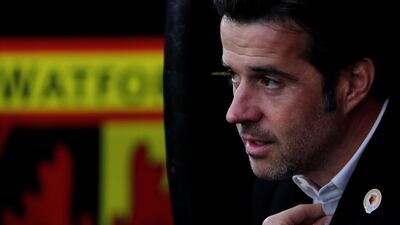The question was posed, before and after the game. It was asked, in different ways, in front of the television cameras and the written press’ dictaphones. Was it Marco Silva’s last game in charge of Watford? Would he commit his future to the club?
Direct answers were conspicuous by their absence. Silva referenced the focus that seemed constant as his players defeated West Ham United 2-0. He repeated the word “speculation” without doing anything to end it. Everton want Silva. He has done little to discourage them. It may be a question of how far he is prepared to go to force a move to Goodison Park.
That may appear forgivable. He works in an unsentimental business. Frank de Boer was appointed by Crystal Palace in the summer, a job that Silva had seemed the favourite for, and sacked after four league games.
________________________________
Read more:
- Team of the week: De Bruyne and Hazard the headline acts for Man City and Chelsea
- Richard Jolly: Watford defeat shows scale of task facing David Moyes at West Ham
- Andy Mitten's football diary, Part 1: Old Trafford game kickstarts a promising tour
________________________________
The employers he picked instead are scarcely bywords for continuity. Silva is Watford’s ninth manager since 2012. Walking out for a bigger club may seem a pre-emptive measure to prevent himself becoming a victim of the Pozzo family’s hire-and-fire policy and Silva has already left one job in 2017 with his reputation untainted.
His decision to quit relegated Hull City, a chaotic club who were shedding players, after a mere 22 games was logical. If he abandons Watford after 13, he should meet with less understanding. Silva may scan the CVs of the managers at elite clubs and rationalise that they have traded up at some stage. But not twice with such swiftness.
The 40-year-old is a young man in a hurry, but being in too much of a rush could render him unsuitable. There comes a point when a manager has to demonstrate some level of commitment if he is to demand it from his players.
The sceptics may argue his reign at Vicarage Road including a six-goal hammering and a cup exit to lower-league opponents, is too small a sample size, to earn him the Everton job. His tactical prowess and his transformative impact at both Hull and Watford suggests otherwise.
If he is determined to leave the latter already, the conclusion should be that he has the talent to manage Everton, but perhaps not the character.
Because Everton see themselves as a destination club, not a stepping stone. They do not market themselves as a staging point on the route to Stamford Bridge or Old Trafford for an upwardly-mobile club-hopping manager.
Any outsider needs to consider history and identity, not merely a 22-year wait for a trophy. David Moyes began by branding them “the people’s club.” He understood Everton in a way their last two managers have not. It is harder to believe Silva will, just as it is difficult to imagine he sees them as anything other than a stop-off on the fast track to the top.
Ronald Koeman did not disguise the fact he hoped to manage Barcelona. It did him few favours when results dried up. But Evertonians had not warmed to the Dutchman, charismatic and quotable as he was, and while there is clearly far more to Silva than the face he presents in public, a persona of an ultra-ambitious but otherwise cold, bland technocrat might not generate loyalty, especially if he does not demonstrate it.
The reality is that it is difficult to make Everton a top-four club. Football has changed too much. But Everton still require a manager who values them.
It is why the best candidate now is David Wagner, who has forged a belief among footballers and fans that Huddersfield is special, not to be jettisoned when a first suitor emerges.
He has rejected offers. He has the exuberance and likeability which, allied with strategic nous and a capacity to get the best out of players who have to demonstrate a work ethic Evertonians demand, makes him a good fit.
Except for one problem: he happens to be Jurgen Klopp’s best man.


